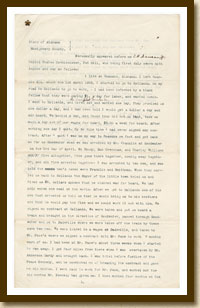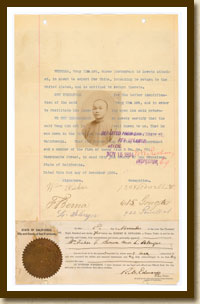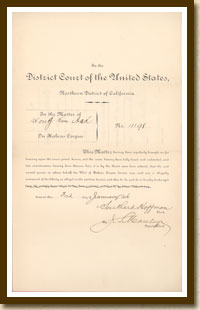Featured Story: Defining Rights
These initial constitutional gains were soon lost as other economic systems—peonage (involuntary servitude) and sharecropping—eroded individual rights. Other ethnic groups, such as the Chinese, also faced discrimination and curtailed rights.
Affidavit of Pat Hill
National Archives, Records of District Courts of the United States (National Archives Identifier 2641475)
After the Civil War, a form of slavery continued through a system of peonage. Thousands of African Americans were arrested for fabricated crimes and forced to work off exorbitant fines. Pat Hill was a victim of this reenslavement—bound, beaten, and forced to work.
Wong Kim Ark’s Departure Statement,
November 5, 1894
National Archives, San Francisco, Records of the Immigration and Naturalization Service (National Archives Identifier 2641490)
Denied reentry to the United States upon his return from an 1894 visit to China, San Francisco-born Wong Kim Ark was detained by the collector of customs in San Francisco. At the U.S. District Court, Mr. Wong filed a habeas corpus action against his detention. Although conceding the fact of Mr. Wong’s birth in San Francisco, the U.S. attorney argued that Mr. Wong was a citizen of China because his parents were born in China.
Wong Kim Ark’s Discharge,
January 3, 1896
National Archives-San Francisco, Records of District Courts of the United States (National Archives Identifier 2641491)
The U.S. District Court in San Francisco determined that Wong Kim Ark “is a citizen of the United States within the meaning of the citizenship clause of the 14th Amendment.” On March 28, 1898, the Supreme Court upheld the District Court opinion and ruled “a child born in the United States to foreign parents who are subject to U.S. jurisdiction automatically becomes a citizen.”




